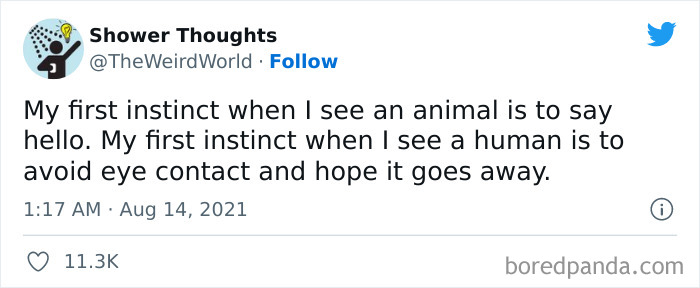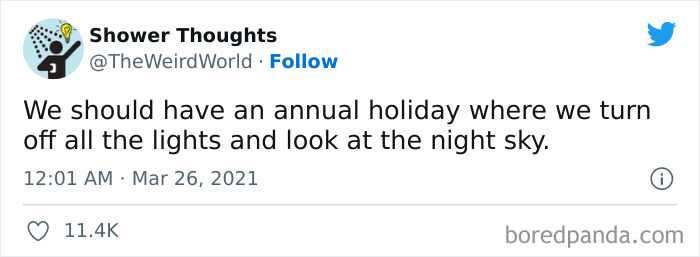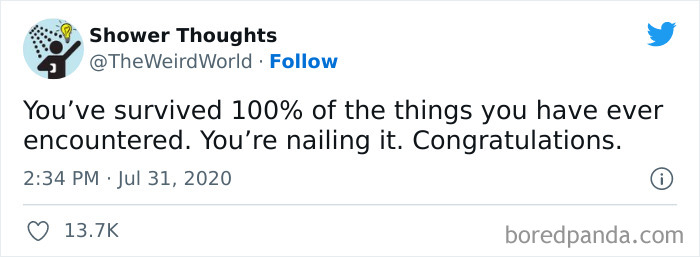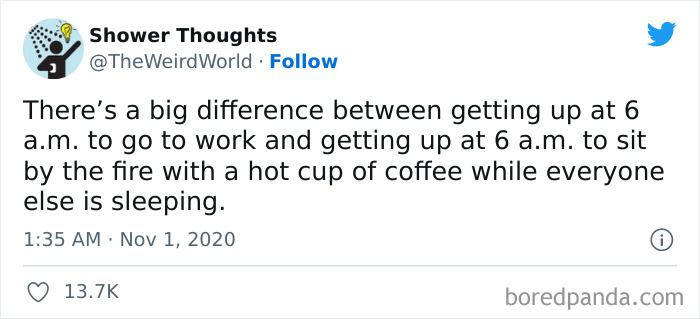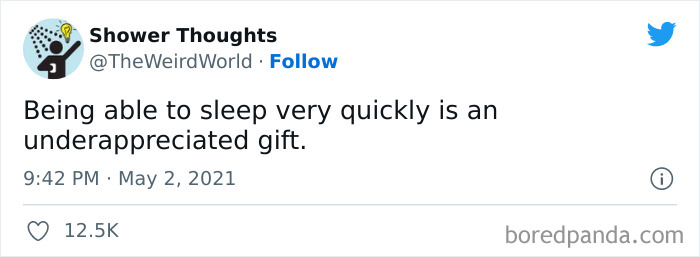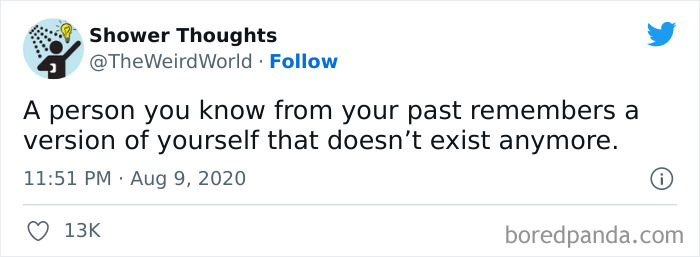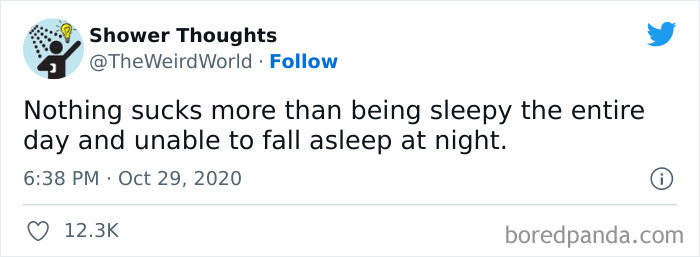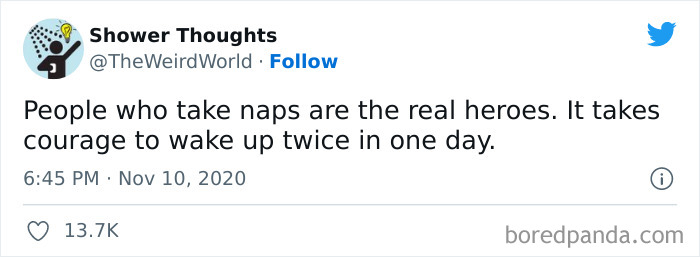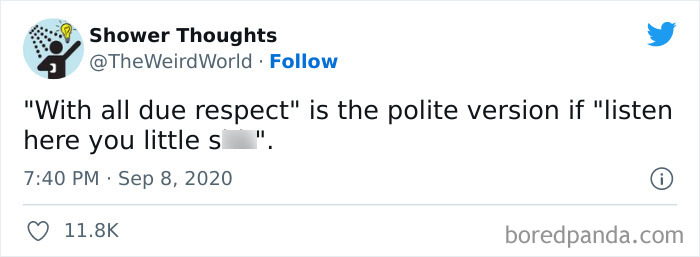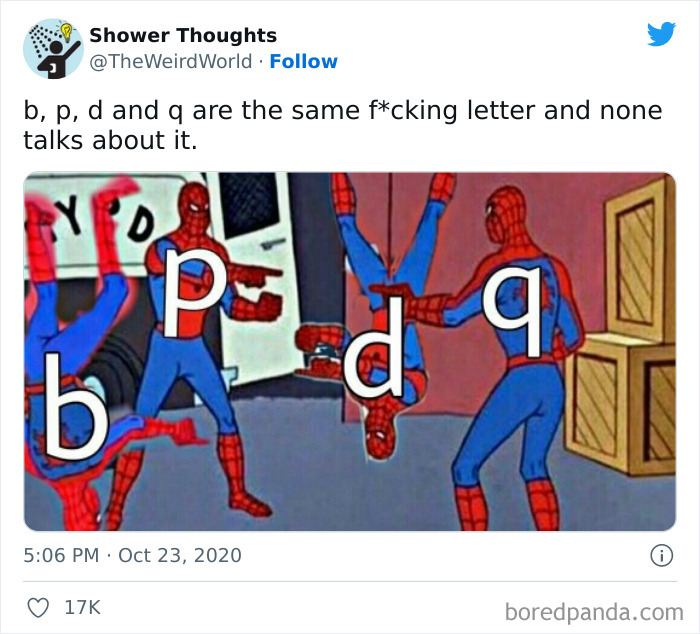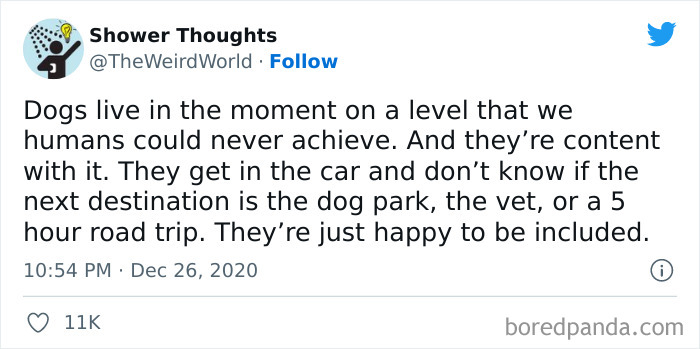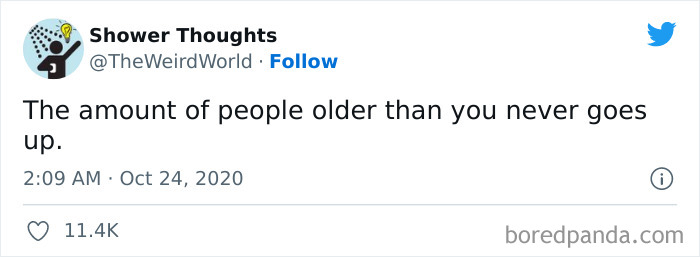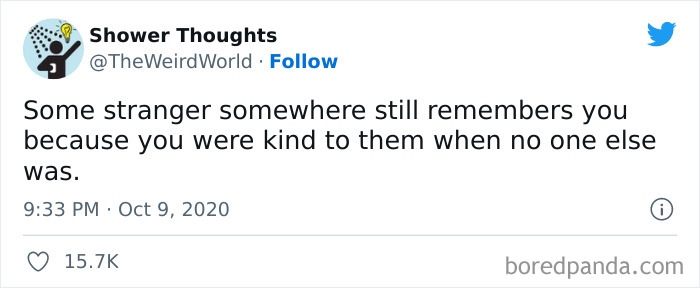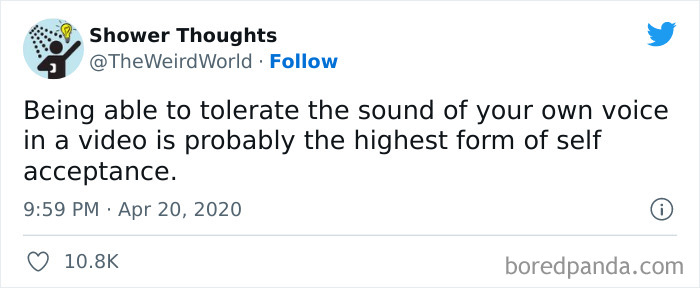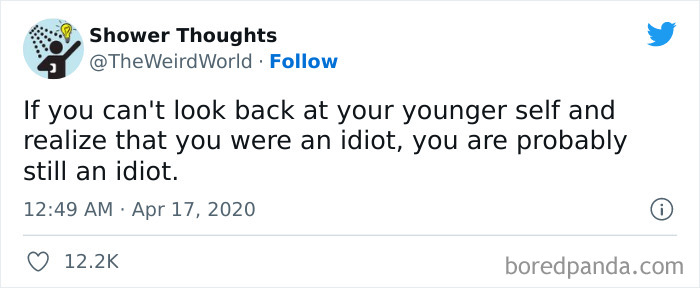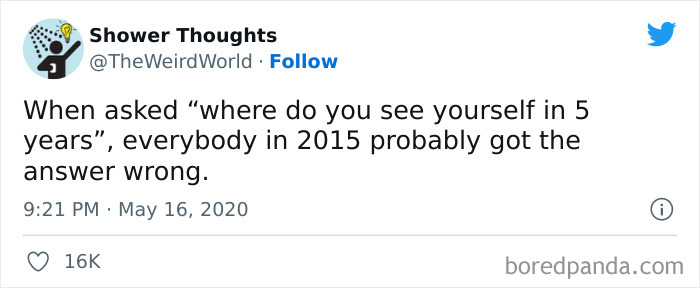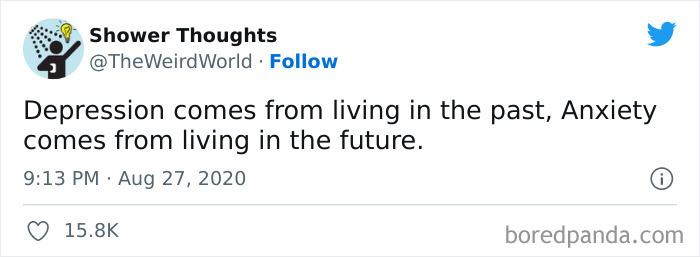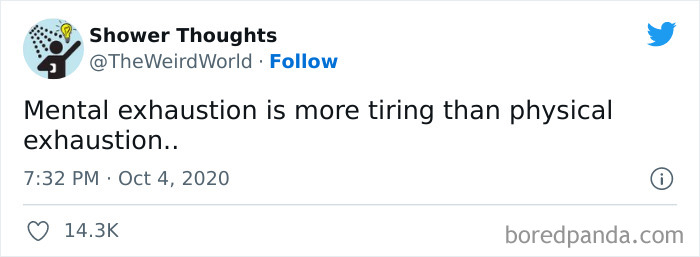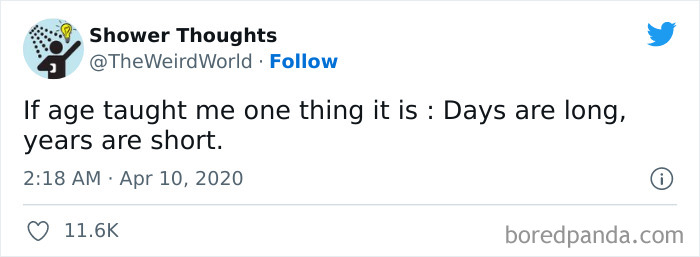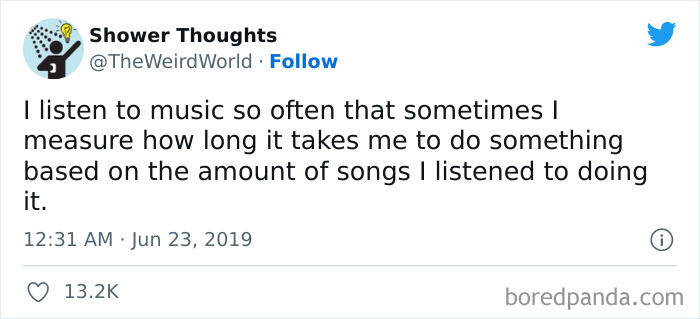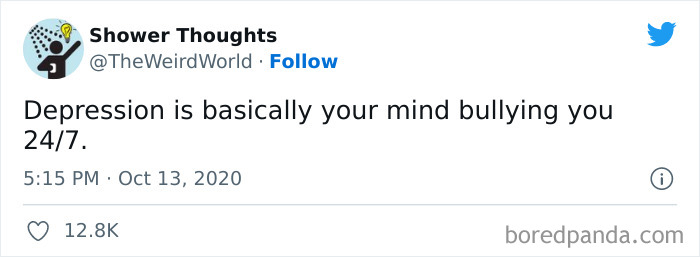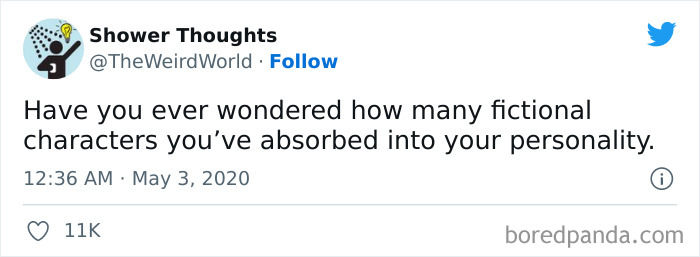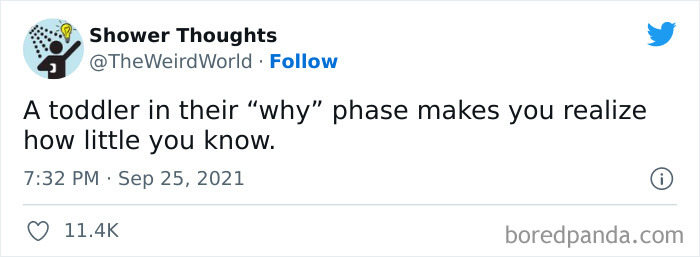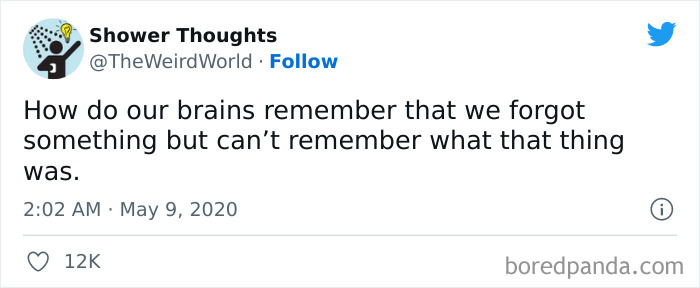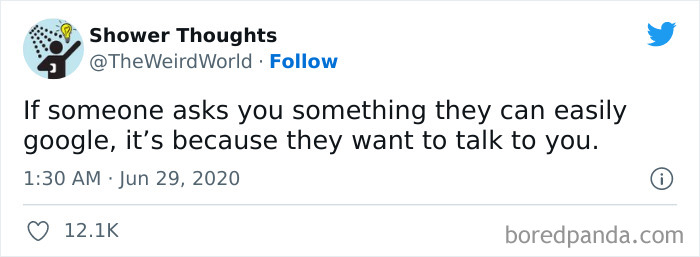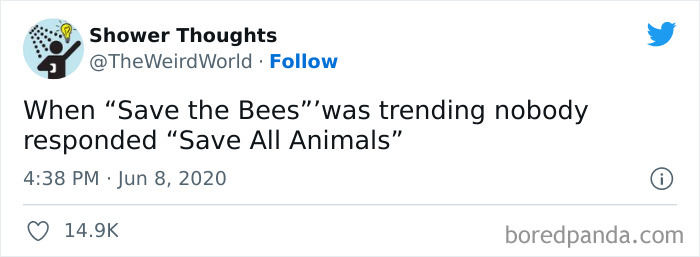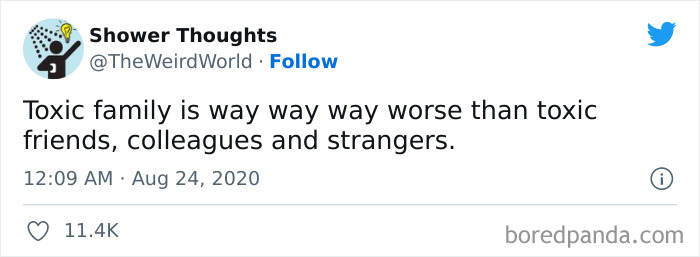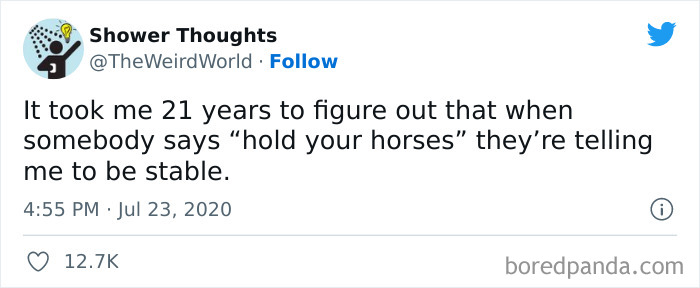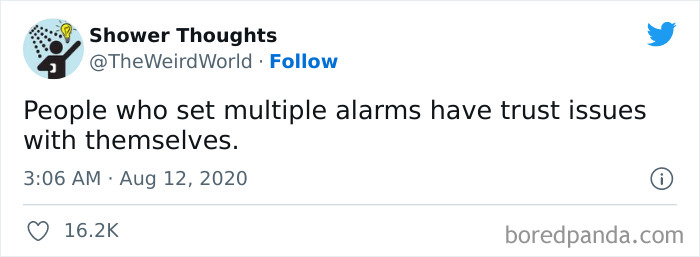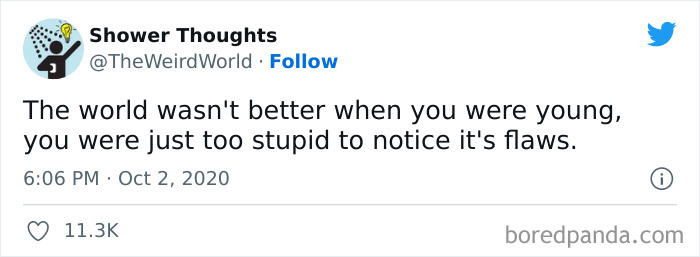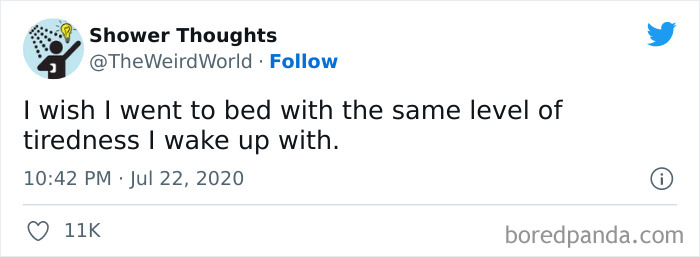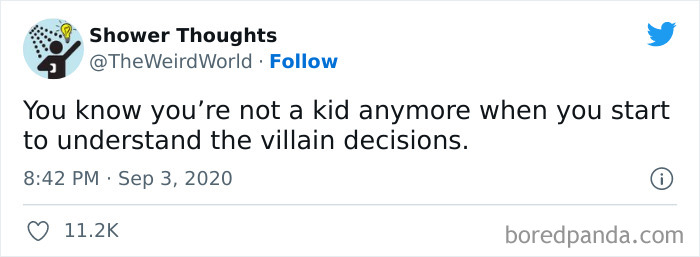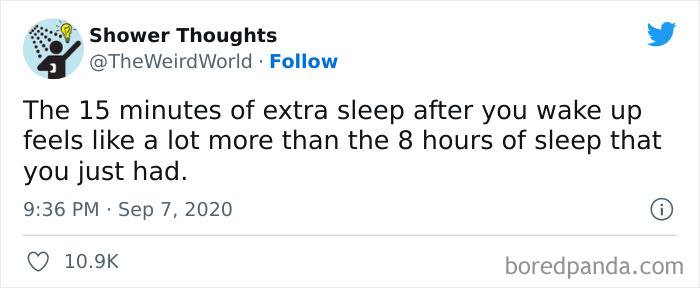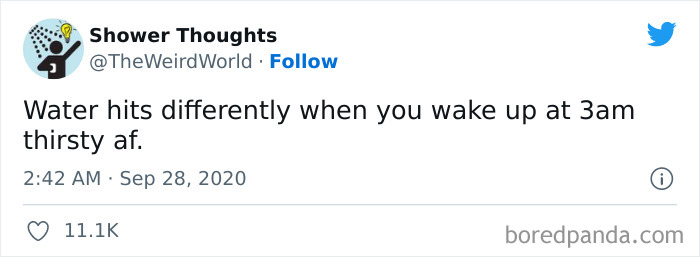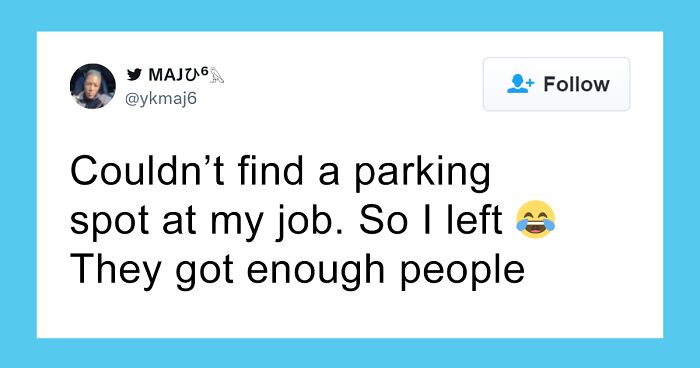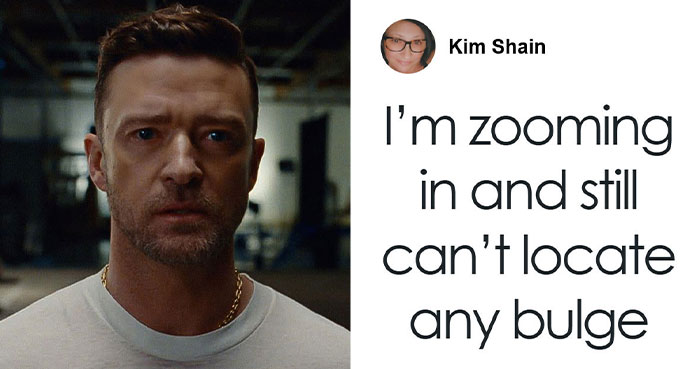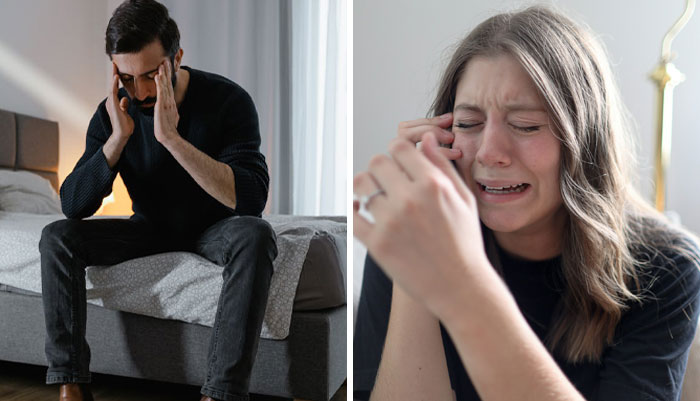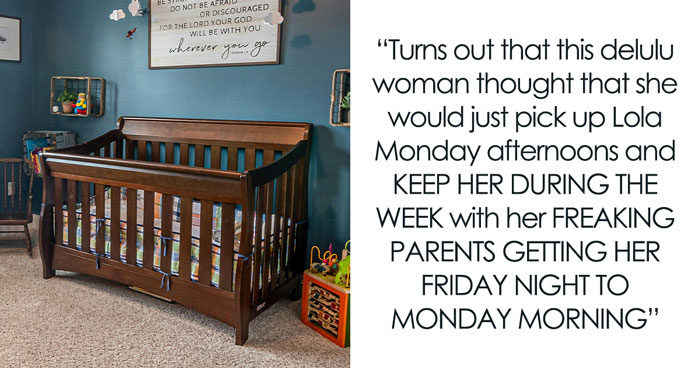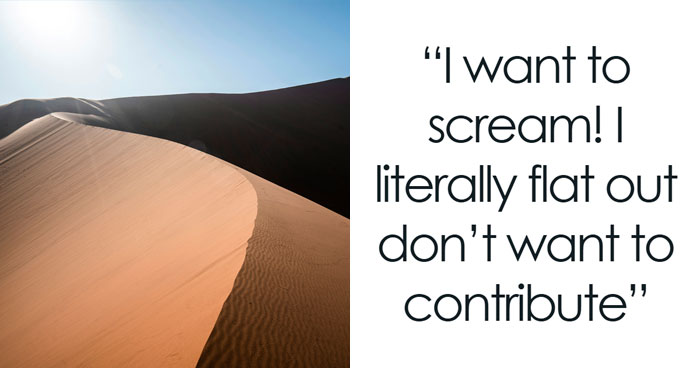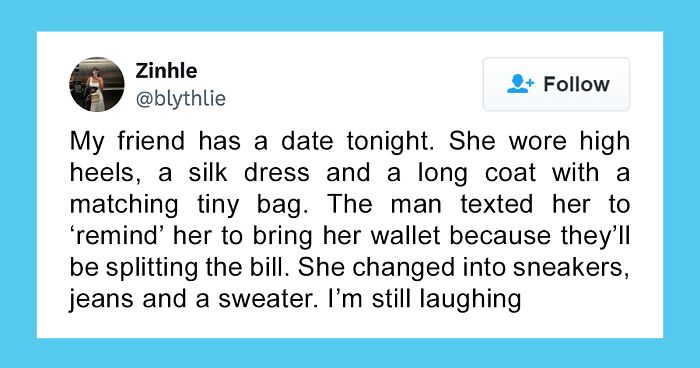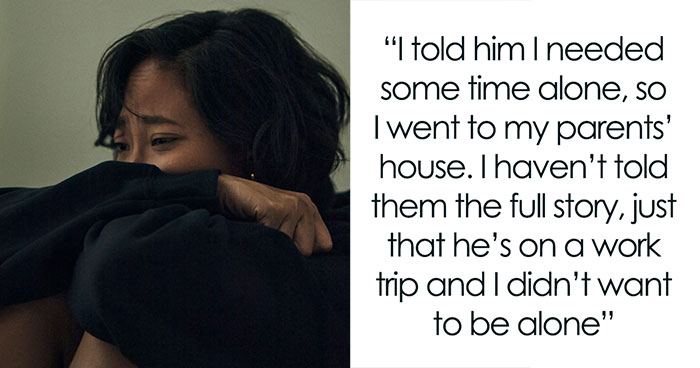
50 Shower Thoughts That Make A Lot Of Sense, As Shared On This Online Page (New Pics)
InterviewAh, the eureka moment. Most of us have experienced this random flash of incredible brilliance and profundity at least once or twice in our lives. And let’s face it, the vast majority of them happen in the shower. This enclosed space and the sound of running water seem to unleash another part of your brain that comes up with pure strokes of genius. Suddenly, you’re running dripping wet for the nearest laptop, afraid this steamy miniature epiphany might evaporate.
Thankfully, the 'Shower Thoughts' page over on Twitter is here to lend a helping hand. With a whopping 7.9 million followers, this social media project is dedicated to documenting the phenomenon and sharing unexpected little gems of wisdom with everyone online.
Below, we wrapped up a collection of funny and fascinating philosophical truths to share with you all. So sit back, relax, and enjoy witnessing those creative ideas flowing. Keep reading to also find an interview about the account with its creator, Krit Verma. Then upvote the thoughts that surprised you most, and be sure to share your own unexpected insights with us in the comments!
This post may include affiliate links.
And the thing I love most about my animals is that they never say anything at all
Yes, when the day off comes, you're just having Monday-itis instead of chilling
We managed to get in touch with the creator of 'Shower Thoughts', Krit Verma, who was kind enough to have a little chat with us. The founder of the account revealed that the idea to start the social media project came to him while he was doing his Master’s degree in Human Resources. "I came across a lot of people who had similar feelings, and I realized that I am not the only one to think that way," he told Bored Panda. Once Krit created a post to find out if others share the same thoughts, "BAM… there are way more people like us, I found out."
Ever since the account was created in February 2012, it has been steadily growing and inviting people from far and wide to share their findings and participate in entertaining discussions. When it comes to the community, Krit explained they send over quite a few submissions via DMs and email. "But it was never hard to manage because the thoughts they share are way too hilarious (though sometimes not suitable for the audience)," he added. The creator said he reads all of the messages from devoted fans, but only shares the ones that won’t offend other Twitter users who follow the account, or as he calls it, "our family".
When asked about his opinion on why we are so keen on hearing others’ shower thoughts, Krit told us everyone can relate to experiencing these brilliant ideas that range from mundane to genius, and that many people simply "have the same imagination."
Of course, shower thoughts aren’t exclusive to showers. They can happen under many different circumstances when there are no devices or other people to bother you. Yet, there’s something about the warm and comforting surroundings of the shower that make it the perfect place to have these seemingly fleeting moments of brilliance. "Having the wittiest thoughts under the shower is the perfect place because 'you can't lose any arguments there' and those won arguments have the potential to create some of the funniest tweets (only if you are able to filter them appropriately)," Krit added.
As Nancy K. Napier, Ph.D., a Distinguished Professor Emerita at Boise State University and author of Unfolding Curiosity: Wrinkles and Surprises from Business and Beyond told us in an earlier interview, the power of a shower happens because it’s an enclosed space where you do something you don’t have to think about.
"As you wash yourself for those three or five or ten minutes, you can let your mind wander and that's often when an idea will hit. Also, during these times when we're with our families in shutdowns, it might be one of the few chances to be alone with your thoughts," she explained.
Yes. And this sentence works with other words than "depression", too (being abused for instance).
Unfortunately, people find it hard to allow their thoughts to drift since there’s just too much information (music, podcasts, radio) finding their way into our minds. "To have the experience of a wandering mind, we need to intentionally turn OFF the extra information and think about nothing."
"I read recently that taking a walk is another great place for ideas, but the key is to simply walk. Leave the radio and podcasts at home," Napier continued. "Then, while walking, look in three places and ideas will come: look above eye level (at buildings, trees), look straight ahead and look on the ground. I tried this last week and came away with two new ideas."
Why do I wake up at 7am on the weekends and want to go back to sleep, but I can't get up on weekdays at the same time?
But as we all know, reaching a still mind is far from an easy task. The professor pointed out that even when we think we’re doing nothing, our brains just keep buzzing. "I've begun strength training and have learned that you should do it one day and then 'rest' the next, to give your muscles time to readjust, recover, and revive," she said. But when we exercise our minds, we often forget to give our thoughts a breather. "I feel that way when I 'do nothing' in my work or thinking — it gives my mind some time to readjust (to not pushing so hard), to recover (from hard work and thinking), and to revive (and play with something that may not have had a chance to pop up)," Napier explained.
If we allow our minds to rest a bit during work hours, Napier suspects that we'll see benefits and perhaps generate new ideas quickly. "Years ago, I worked with a group of faculty members (five of us, very different fields, ways of thinking) to design a new academic program. We started with an empty whiteboard for every meeting. After a few false starts, we learned to trust that we would have some great ideas by the end of each meeting. By removing the expectation and pressure of being creative, we became dramatically more competent at finding ideas. We allowed 'nothing' to be our starting point and that freed us to generate some great (and many not-so-great) ideas," Napier added.
This always makes me sad. It's like all the people from your primary school no longer exist
If you find it hard to let your mind wander, the professor explained that luckily, increasing our creativity doesn’t require much effort. She recommended starting out small, maybe with one day a week or in the evenings on the way home.
"Now that we're working from home more, however, it seems harder to find that clear-cut quiet or 'nothing time,'" she noted. "I've been trying (not fully successfully, I'll admit) to take 30 minutes after my morning work time to just lie down, go into that semi-sleep mode, and boom, good ideas seem to come then. Once again, by giving my brain a little 'downtime,' it continues to work but maybe goes at its own pace and then drops some creativity on its own time."
Explaining depression to someone who has never experienced it is like explaining the colour blue to a worm
To become better at doing nothing, Napier advised you to "find activities that don't require heavy thought and use that as a time to let your brain wander; or have a set routine or habit that builds in some snippets of downtime." Several pockets of time that allow the professor to have a distracted mind and let her imaginations run free are her commute, taking a shower, and making coffee or tea.
You are paid according to how little someone can get away with valuing you, before you realise your own self worth
Moreover, Napier sets the alarm to work for 40 minutes and then stops for 10, using that as downtime. "Some people lie down on a yoga mat and just meditate or sleep; ironing (20 minutes); laundry folding (5-10 minutes). Then, there are the specific gifts of time I offer to myself — when I declare I'll take an hour in the day to look at the clouds or birds."
"I suspect now, more than ever, we need the self-care of doing nothing now and then, and we need to make it something that happens regularly, not just when we're forced into it (when we get sick, injured)," Napier concluded.
Anyone take a nap and wake up thinking it's five minutes later, but it's dark, and you don't know what day it is?
Good point! I knew b and p.. but also d and q we sometimes leave out… looks like someone was lazy…
Some doggos know when they’re going to the vet. My cats too. Then they hide behind curtains.
BUT. Current model is still not a good model for education.
Load More Replies...Yup. It's not about what you learn it's about how much of it you can absorb and regurgitate on a test. Ever question or correct a teacher? Unheard of.
Actually, I have corrected teachers, more than once. I had a maths lecturer who kept writing "devide" of example, and a primary school teacher who insisted that clocks had to go back when they're slow. It's the same principle with senior people in one's workplace - they're people, and fallible, and one should never be afraid of correcting incorrect fact (NB before you get fired, their _opinion_ is worth more than yours).
Load More Replies...Schools teach you how to conform to rules and expectations and follow someone's orders without question so you can feed into capitalism as an adult...
Not the good ones. The good ones teaches you how to ask the right question, and where/how to find the answers to them.
Load More Replies...Incorrect. Maths tests for problem solving ability, English tests your analytical skills, sports test your physical prowess, drama / music / visual arts test your creativity etc.
In some subjects, yes, to a degree. However, the real goal is to develop understanding of a subject, and to be able to develop ones own conclusions based on the prior knowledge. For instance, learning how to find the area of something in geometry is a lesson in memory. Using that to help design the floor plan of a house you are designing is not.
This isn't deep or clever. Knowledge is what you remember. If you don't remember it, you don't know it.
Teachers, books, and educational experiences give students the opportunity to obtain knowlwdege. How students respond is up to them.
Memory is very important as long as the stuff you remember is useful and correct.
Yet--think about it--most of what we "know" relates directly to memory--what we've seen, heard, read, handled etc. I don't think we've really learned something until we can remember it--whether it's from school, home, or personal experiece.
No s**t....you need to be taught how to remember boring things because your work is going to require you to remember boring things.
Not really... we live in the age of *The Internet* where we can google something if we need to.
Load More Replies...Mental exhaustion feels the same as physical exhaustion, but you haven't got the ripped abs to show for it
That's how I time the conditioner application on my hair in the shower.
Depression is computer says no, plus a disruption to the internet connection, plus the sinking feeling of losing your entire assignment without having backed it up
Based on the number of grown adults who actually identify themselves by their Hogwarts class name, quite a few.
A fool thinks they know everything; a wise man knows he knows nothing. I made that up, but Plato made it up first
Yes-thank you! Also any room you're conceived in-technically, to be thorough about it.
Load More Replies...Yes-thank you! Also any room you're conceived in-technically, to be thorough about it.
Load More Replies...
 Dark Mode
Dark Mode 

 No fees, cancel anytime
No fees, cancel anytime 


